论习语及习语的汉英翻译
- 格式:doc
- 大小:76.50 KB
- 文档页数:20
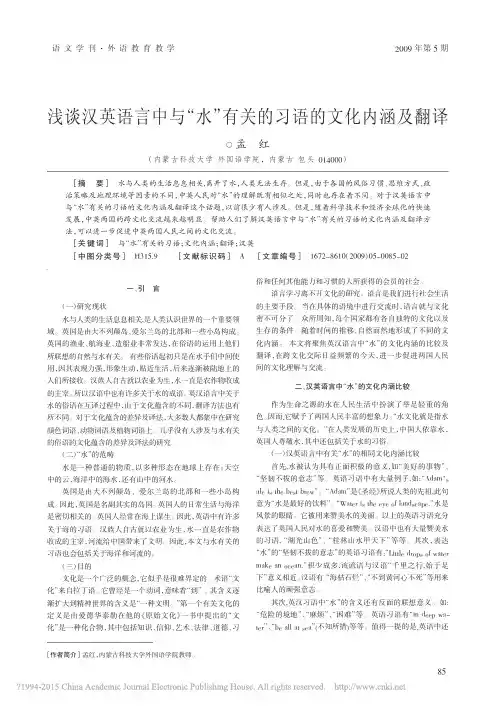
2009年第5期语文学刊·外语教育教学○孟红(内蒙古科技大学外国语学院,内蒙古包头014000)[作者简介]孟红,内蒙古科技大学外国语学院教师。
[摘要]水与人类的生活息息相关,离开了水,人类无法生存。
但是,由于各国的风俗习惯、思维方式、政治策略及地理环境等因素的不同,中英人民对“水”的理解既有相似之处,同时也存在着不同。
对于汉英语言中与“水”有关的习语的文化内涵及翻译这个话题,以前很少有人涉及。
但是,随着科学技术和经济全球化的快速发展,中英两国的跨文化交流越来越明显。
帮助人们了解汉英语言中与“水”有关的习语的文化内涵及翻译方法,可以进一步促进中英两国人民之间的文化交流。
[关键词]与“水”有关的习语;文化内涵;翻译;汉英[中图分类号]H315.9[文献标识码]A[文章编号]1672-8610(2009)05-0085-02浅谈汉英语言中与“水”有关的习语的文化内涵及翻译一、引言(一)研究现状水与人类的生活息息相关,是人类认识世界的一个重要领域。
英国是由大不列颠岛、爱尔兰岛的北部和一些小岛构成。
英国的渔业、航海业、造船业非常发达,在俗语的运用上他们所联想的自然与水有关。
有些俗语起初只是在水手们中间使用,因其表现力强,形象生动,贴近生活,后来逐渐被陆地上的人们所接收。
汉族人自古就以农业为生,水一直是农作物收成的主宰。
所以汉语中也有许多关于水的成语。
英汉语言中关于水的俗语在互译过程中,由于文化蕴含的不同,翻译方法也有所不同。
对于文化蕴含的差异及译法,大多数人都集中在研究颜色词语、动物词语及植物词语上。
几乎没有人涉及与水有关的俗语的文化蕴含的差异及译法的研究。
(二)“水”的范畴水是一种普通的物质,以多种形态在地球上存在:天空中的云,海洋中的海水,还有山中的河水。
英国是由大不列颠岛、爱尔兰岛的北部和一些小岛构成。
因此,英国是名副其实的岛国。
英国人的日常生活与海洋是密切相关的。
英国人经常在海上谋生。
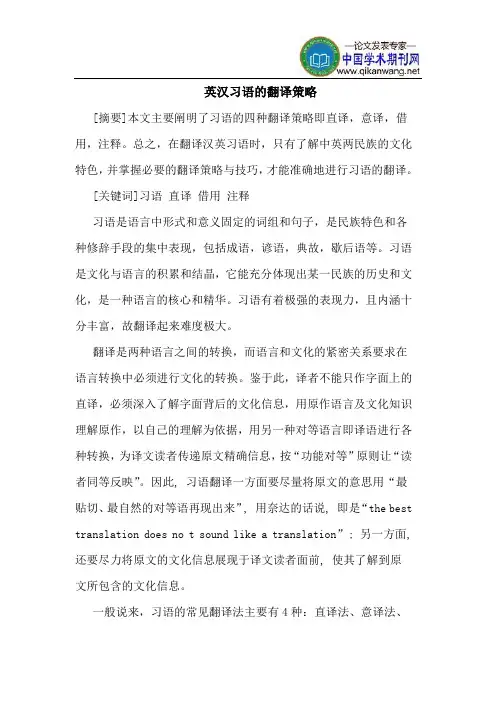
英汉习语的翻译策略[摘要]本文主要阐明了习语的四种翻译策略即直译,意译,借用,注释。
总之,在翻译汉英习语时,只有了解中英两民族的文化特色,并掌握必要的翻译策略与技巧,才能准确地进行习语的翻译。
[关键词]习语直译借用注释习语是语言中形式和意义固定的词组和句子,是民族特色和各种修辞手段的集中表现,包括成语,谚语,典故,歇后语等。
习语是文化与语言的积累和结晶,它能充分体现出某一民族的历史和文化,是一种语言的核心和精华。
习语有着极强的表现力,且内涵十分丰富,故翻译起来难度极大。
翻译是两种语言之间的转换,而语言和文化的紧密关系要求在语言转换中必须进行文化的转换。
鉴于此,译者不能只作字面上的直译,必须深入了解字面背后的文化信息,用原作语言及文化知识理解原作,以自己的理解为依据,用另一种对等语言即译语进行各种转换,为译文读者传递原文精确信息,按“功能对等”原则让“读者同等反映”。
因此, 习语翻译一方面要尽量将原文的意思用“最贴切、最自然的对等语再现出来”, 用奈达的话说, 即是“the best translation does no t sound like a translation”; 另一方面, 还要尽力将原文的文化信息展现于译文读者面前, 使其了解到原文所包含的文化信息。
一般说来,习语的常见翻译法主要有4种:直译法、意译法、借用法、注释法。
下面我们分别谈谈每种译法的具体思路。
一、直译法直译,指在不违背译文语言规范以及不引起错误联想的条件下,在译文中保留原习语的民族色彩、语言风格和比喻形象的方法。
例如:鱼目混珠—pass fish eye for pearls摊出最后一张牌—play one’s last card像狐狸一样狡猾—as cunning as a fox类似这样的习语译文,读者只要用心体会一下,就会明白其隐含意义,不但保留了原文的形象,而且增加了阅读的趣味二、意译法意译法指在充分理解原习语的基础上,舍弃其中陌生难懂的比喻形象而采用的一种方法。
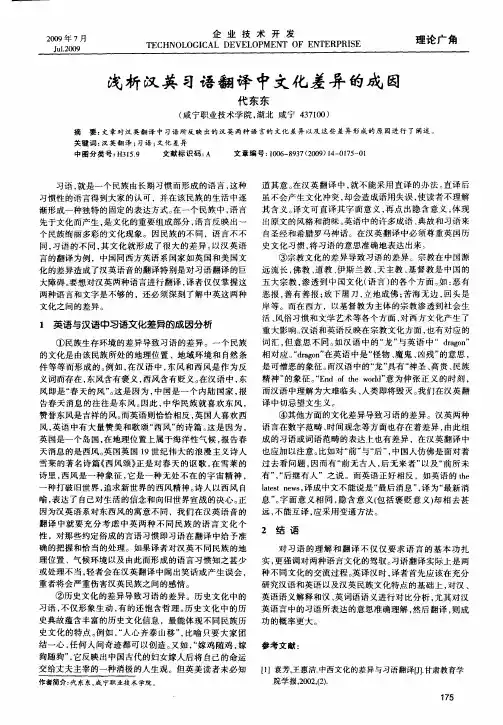
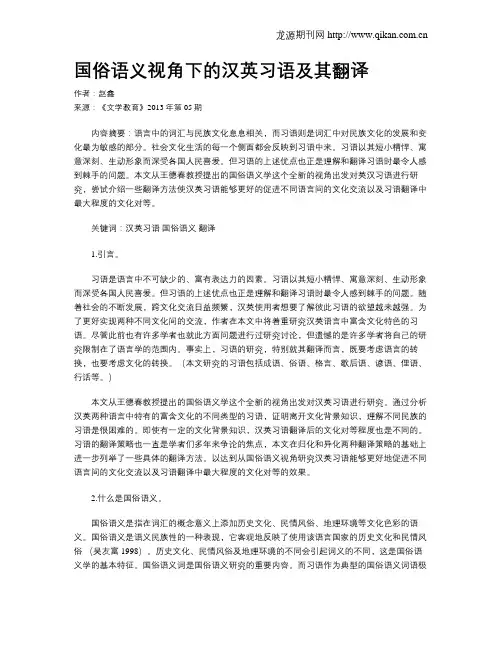
国俗语义视角下的汉英习语及其翻译作者:赵鑫来源:《文学教育》2013年第05期内容摘要:语言中的词汇与民族文化息息相关,而习语则是词汇中对民族文化的发展和变化最为敏感的部分。
社会文化生活的每一个侧面都会反映到习语中来。
习语以其短小精悍、寓意深刻、生动形象而深受各国人民喜爱。
但习语的上述优点也正是理解和翻译习语时最令人感到棘手的问题。
本文从王德春教授提出的国俗语义学这个全新的视角出发对英汉习语进行研究,尝试介绍一些翻译方法使汉英习语能够更好的促进不同语言间的文化交流以及习语翻译中最大程度的文化对等。
关键词:汉英习语国俗语义翻译1.引言。
习语是语言中不可缺少的、富有表达力的因素。
习语以其短小精悍、寓意深刻、生动形象而深受各国人民喜爱。
但习语的上述优点也正是理解和翻译习语时最令人感到棘手的问题。
随着社会的不断发展,跨文化交流日益频繁,汉英使用者想要了解彼此习语的欲望越来越强。
为了更好实现两种不同文化间的交流,作者在本文中将着重研究汉英语言中富含文化特色的习语。
尽管此前也有许多学者也就此方面问题进行过研究讨论,但遗憾的是许多学者将自己的研究限制在了语言学的范围内。
事实上,习语的研究,特别就其翻译而言,既要考虑语言的转换,也要考虑文化的转换。
(本文研究的习语包括成语、俗语、格言、歇后语、谚语、俚语、行话等。
)本文从王德春教授提出的国俗语义学这个全新的视角出发对汉英习语进行研究。
通过分析汉英两种语言中特有的富含文化的不同类型的习语,证明离开文化背景知识,理解不同民族的习语是很困难的。
即使有一定的文化背景知识,汉英习语翻译后的文化对等程度也是不同的。
习语的翻译策略也一直是学者们多年来争论的焦点,本文在归化和异化两种翻译策略的基础上进一步列举了一些具体的翻译方法。
以达到从国俗语义视角研究汉英习语能够更好地促进不同语言间的文化交流以及习语翻译中最大程度的文化对等的效果。
2.什么是国俗语义。
国俗语义是指在词汇的概念意义上添加历史文化、民情风俗、地理环境等文化色彩的语义。
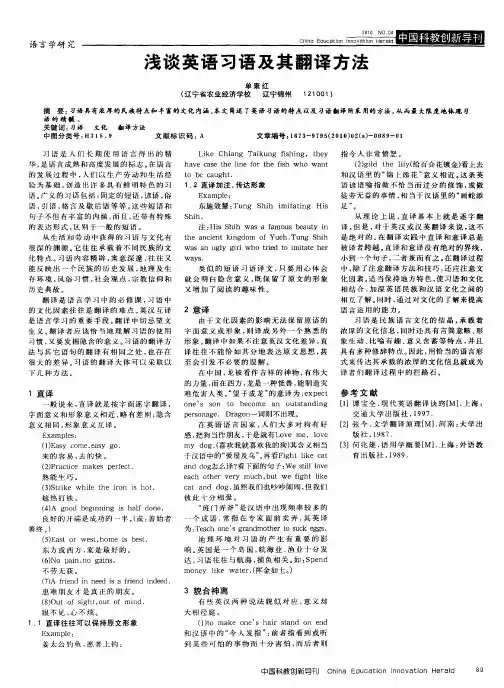
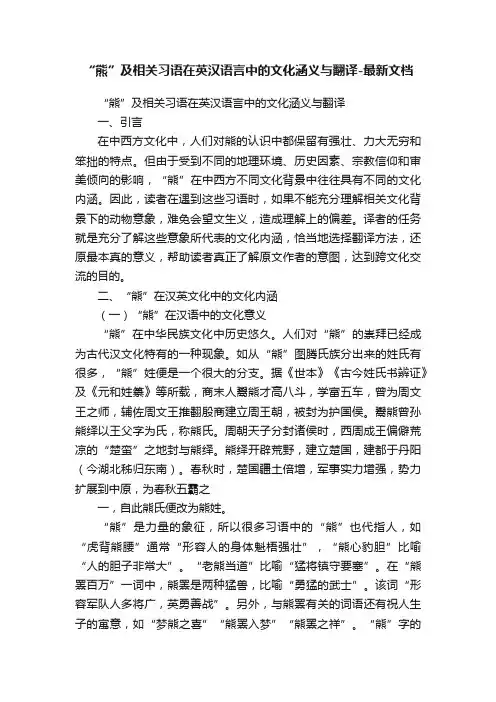
“熊”及相关习语在英汉语言中的文化涵义与翻译-最新文档“熊”及相关习语在英汉语言中的文化涵义与翻译一、引言在中西方文化中,人们对熊的认识中都保留有强壮、力大无穷和笨拙的特点。
但由于受到不同的地理环境、历史因素、宗教信仰和审美倾向的影响,“熊”在中西方不同文化背景中往往具有不同的文化内涵。
因此,读者在遇到这些习语时,如果不能充分理解相关文化背景下的动物意象,难免会望文生义,造成理解上的偏差。
译者的任务就是充分了解这些意象所代表的文化内涵,恰当地选择翻译方法,还原最本真的意义,帮助读者真正了解原文作者的意图,达到跨文化交流的目的。
二、“熊”在汉英文化中的文化内涵(一)“熊”在汉语中的文化意义“熊”在中华民族文化中历史悠久。
人们对“熊”的崇拜已经成为古代汉文化特有的一种现象。
如从“熊”图腾氏族分出来的姓氏有很多,“熊”姓便是一个很大的分支。
据《世本》《古今姓氏书辨证》及《元和姓纂》等所载,商末人鬻熊才高八斗,学富五车,曾为周文王之师,辅佐周文王推翻殷商建立周王朝,被封为护国侯。
鬻熊曾孙熊绎以王父字为氏,称熊氏。
周朝天子分封诸侯时,西周成王偏僻荒凉的“楚蛮”之地封与熊绎。
熊绎开辟荒野,建立楚国,建都于丹阳(今湖北秭归东南)。
春秋时,楚国疆土倍增,军事实力增强,势力扩展到中原,为春秋五霸之一,自此熊氏便改为熊姓。
“熊”是力量的象征,所以很多习语中的“熊”也代指人,如“虎背熊腰”通常“形容人的身体魁梧强壮”,“熊心豹胆”比喻“人的胆子非常大”。
“老熊当道”比喻“猛将镇守要塞”。
在“熊罴百万”一词中,熊罴是两种猛兽,比喻“勇猛的武士”。
该词“形容军队人多将广,英勇善战”。
另外,与熊罴有关的词语还有祝人生子的寓意,如“梦熊之喜”“熊罴入梦”“熊罴之祥”。
“熊”字的篆体写法是上能下火,是在缘体向汉字演变过程中,形成了偏旁两点为“冰”、三点为“水”、四点为“火”的规则,如“热”“然”“熙”等字在篆体中均是“火”字底。
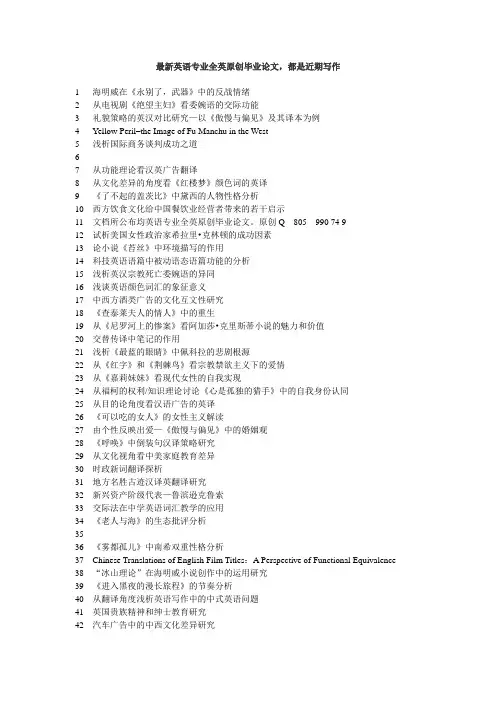
最新英语专业全英原创毕业论文,都是近期写作1 海明威在《永别了,武器》中的反战情绪2 从电视剧《绝望主妇》看委婉语的交际功能3 礼貌策略的英汉对比研究—以《傲慢与偏见》及其译本为例4 Yellow Peril–the Image of Fu Manchu in the West5 浅析国际商务谈判成功之道67 从功能理论看汉英广告翻译8 从文化差异的角度看《红楼梦》颜色词的英译9 《了不起的盖茨比》中黛西的人物性格分析10 西方饮食文化给中国餐饮业经营者带来的若干启示11 文档所公布均英语专业全英原创毕业论文。
原创Q 805 990 74 912 试析美国女性政治家希拉里•克林顿的成功因素13 论小说《苔丝》中环境描写的作用14 科技英语语篇中被动语态语篇功能的分析15 浅析英汉宗教死亡委婉语的异同16 浅谈英语颜色词汇的象征意义17 中西方酒类广告的文化互文性研究18 《查泰莱夫人的情人》中的重生19 从《尼罗河上的惨案》看阿加莎•克里斯蒂小说的魅力和价值20 交替传译中笔记的作用21 浅析《最蓝的眼睛》中佩科拉的悲剧根源22 从《红字》和《荆棘鸟》看宗教禁欲主义下的爱情23 从《嘉莉妹妹》看现代女性的自我实现24 从福柯的权利/知识理论讨论《心是孤独的猎手》中的自我身份认同25 从目的论角度看汉语广告的英译26 《可以吃的女人》的女性主义解读27 由个性反映出爱—《傲慢与偏见》中的婚姻观28 《呼唤》中倒装句汉译策略研究29 从文化视角看中美家庭教育差异30 时政新词翻译探析31 地方名胜古迹汉译英翻译研究32 新兴资产阶级代表—鲁滨逊克鲁索33 交际法在中学英语词汇教学的应用34 《老人与海》的生态批评分析3536 《雾都孤儿》中南希双重性格分析37 Chinese Translations of English Film Titles:A Perspective of Functional Equivalence38 “冰山理论”在海明威小说创作中的运用研究39 《进入黑夜的漫长旅程》的节奏分析40 从翻译角度浅析英语写作中的中式英语问题41 英国贵族精神和绅士教育研究42 汽车广告中的中西文化差异研究43 浅析中美商务谈判中的文化冲突44 流行语的翻译45 论企业对员工过度压力的管理46 从消费心理学角度谈汽车品牌名称的翻译47 “It be Adj of sb to do sth”中形容词语义的构式语法研究48 初中英语说写技能综合教学研究49 《嘉莉妹妹》中女主人公的服饰所反映的女性意识50 教师的态度对初中学生英语学习的影响51 On the Translation of Psychological Description in Wuthering Heights from the Perspective of Functional Equivalence52 从目的论角度浅谈电影字幕翻译53 从目的论的角度比较研究《茶馆》的两个英文译本54 大学生上网调查55 英语动词时态的认知及隐喻概念研究56 浅析艾米丽•迪金森诗歌的主题思想57 从美国总统就职演说看美国文化价值观58 On the Female Character During the War Through A Farewell to Arms59 A Brief Analysis of Chinese and American Philanthropists in Recent Ten Years60 论美国黑人英语:语言变体的视角61 论《红楼梦》英译本中“红”字的翻译62 希腊罗马神话对英语习语的影响63 苔丝和傲慢与偏见中的女性意识之对比研究64 口译中的语用失误分析65 中英酒吧文化对比66 《了不起的盖茨比》中象征主义的研究67 A Comparative Study on Chinese and American Education68 英汉称谓语对比分析69 目的论视角下公示语汉英翻译研究70 海明威短篇小说的叙述艺术--以《一个明亮干净的地方》为例71 《阿甘正传》——美国传统价值观的回归72 英汉基本姿势动词(立、坐、躺)的语义实证比较研究73 英文影片名汉译中的文化多元性初探74 《心是孤独的猎手》中的主题分析75 布什总统演讲词中幽默话语的语用功能分析76 On the Fighting Spirit of Buck in The Call of The Wild77 用合作原则分析男性广告语的诉求78 希腊神话对英语语言的影响79 从接受美学角度分析企业简介汉英翻译80 消费文化社会下嘉莉的生存斗争81 The Comparison of Marriage Traditions between China and America82 弗吉尼亚•伍尔夫《达洛维夫人》中印象主义创作手法探讨83 从历史剧中的君王形象看莎士比亚的君王观84 论《弗兰肯斯坦》中怪物的孤独与沉沦85 论《瓦尔登湖》中梭罗的超验主义哲学观86 奥斯卡•王尔德《道林格雷的画像》和西奥多•德莱赛《美国悲剧》的相似性87 从女性主义角度看《觉醒》中爱德娜的女性主体意识觉醒88 诠释《儿子与情人》中儿子、母亲、情人之间的关系89 从电影《刮痧》看中西文化冲突90 Olympic Economy91 试比较《汤姆索亚历险记》与《哈克贝利芬历险记》中主人公性格异同点92 从文本类型角度看旅游宣传资料的汉英翻译93 Approaching English V ocabulary Teaching—a Lexicological Perspective94 汉英翻译中的文化因素95 浅析目的论下宣传标语的英译失误96 浅析福斯特《霍华德庄园》中的人文主义97 培根《论读书》多种译本的比较98 试论爱伦•坡的作品在当时遭受非议的必然性99 自然观的演变——《自然》与《走出去思考》之对比分析100 从概念整合视角解读《老友记》中的言语幽默101 浅析英文爱情诗的特点与翻译方法102 浅析简•奥斯丁在《傲慢与偏见》中的女性主义103 英语语义歧义分析及其语用价值104 “有”的用法及其英译研究105 从伊登和盖茨比之死探析美国梦破灭的必然性106 埃德加爱伦坡哥特小说中的死亡主题探索107 从传播美学分析国内畅销知名化妆品广告中的译文108 从语用学视角初步分析英语骂詈语109 莎士比亚《李尔王》中的女性角色塑造110111 论《格列佛游记》的社会意义112 从关联理论看《茶馆》两个英译本中修辞格的处理113 Sexism in English and Its Causes114 动之以情,晓之以理---浅析语法情景教学在中学英语课堂中的设计与运用115 Social Criticism in Wordsworth’s Concept of Nature116 论《吉姆老爷》中的英雄主义(开题报告+论)117 从中英文动物词汇看中西方文化差异118 言语行为理论视角下的商务索赔信函话语分析119 Women in the Roaring Twenties– A Comparative Study of Female Characters in The Great Gatsby and The Sun Also Rises120 《呼啸山庄》的叙事策略121 功能对等理论在汉英广告翻译中的应用122 沃尔玛策略研究123 从输出原理探讨非英专业英语口语活动的设计124 论图片和卡片在中学英语教学中的合理应用125 英汉工具类名转动词实时构建的整合分析--基于网络论坛语料126 论《喜福会》中中美文化的冲突与融合127 浅析星巴克现象中的独特文化128 隐喻视野下英汉动物词汇文化内涵的比较分析129 An Analysis of the Cultural Identity in Amy Tan’s The Joy Luck Club130 论《好人难寻》中的哥特特征131 对爱德加爱伦坡哥特式小说中象征手法的研究132 浅论创造性叛逆—以《一朵红红的玫瑰》三个译本为例133 《汤姆叔叔的小屋》中的圣经人物原型分析134 用本我,自我,超我的弗洛伊德理论来解析《红字》135 浅析《麦田里的守望者》中的部分重要象征物136 从审美视角分析中国古典诗词的英译137 英语阅读中的词汇教学138 外交语言策略中的合作原则139 排比的修辞功能在政治演讲辞中的应用140 西方文化中的吸血鬼形象与东方文化中的鬼形象之对比141 英语歧义初探及其排除方法142 初探法律英语用词的准确性与模糊性143 《人性的枷锁》——菲利普的灰色人生144 被忽略的人群--詹姆斯乔伊斯《都柏林人》女性角色分析145 从《小王子》看成人世界的身份危机146 简爱与林黛玉的形象比较分析147 看翻译中的文化因素148 中美商务谈判风格差异149 论《丽塔海华丝和肖申克救赎》中的反讽150 Analyzing Holden's Character in The Catcher in the Rye151 美国西部文学中的牛仔形象所体现出的美国英雄主义152 目的论指导下《页岩》英译汉中的词类转译现象153 《呼啸山庄》男主人公希斯克里夫的性格分析154 习语翻译中的文化缺省和补偿155 商务英语中模糊限制语的语用学研究156 翻译的对等性研究及其应用157 如何增强小学生英语课堂教学的趣味性158 美国女性地位变化浅析159 The Relationship Between Character and Destiny: An Analysis of Sense and Sensibility 160 王尔德童话中的美学观和内在矛盾161 A Comparison of the English Color Terms162 Situational Approach to Grammar Teaching in Senior High English Classes163 跨文化视角中中英颜色词的对比及翻译164 以学生为主体的教学在初中英语写作教学中的应用165 莎士比亚喜剧中的人文主义爱情观166 试析《生死疲劳》英文版风格之再现:文学文体学视角167 《飘》中郝思嘉性格特征透析168 论奥斯卡•王尔德《道林格雷的画像》中的死亡结局与唯美主义169 On Translation of Culture-Loaded Words in Subtitle of Ashes of Time Redux170 广告翻译中的功能对等171 浅谈交际教学法在中学课堂中的问题与对策172 Rhetoric and Translation of English News Headlines:From the Perspective of Receptors173 中西婚姻文化差异174 英语课堂焦虑对小学生英语学习的影响及解决策略175 中国高校名的英译176 凯瑟琳曼斯菲尔德小说中的旅行主题分析177 On Nabokov’s ―Lolita‖ and Its Adaptation into the Movie by Stanley Kubrick178 如何激发和培养初中生学习英语的兴趣179 浅析李尔王的陷落180 交际法在初中英语教学中的运用181 从礼貌原则分析美国总统就职演说辞的语用特色182 目的论指导下的旅游资料汉英翻译及翻译策略183 浅谈进口商品商标的翻译184 初中英语听力水平调查研究---以钢城十二中为例的个案调查185 A Study of English Classroom Scene Setting in Junior High School186 Americans’ Understanding of Chine se Culture as Viewed from Two Movies Mulan and Kung Fu Panda187 《了不起的盖茨比》中的象征手法188 浅析《献给艾米莉的玫瑰》中渐渐消失的玫瑰189 基于语义场理论的英语词汇习得研究190 林肯话语中幽默特征的分析191 Reconstruction of Black Identity in Toni Morrison’s Beloved192 A Symbolic Analysis of Paradise Lost193 《欲望号街车》女主人公悲剧性命运的女性主义解读194 On the Application of Newmark’s Theory in Tourism English Translation195 《名利场》利蓓加•夏泼和《简•爱》简•爱的对比研究196 英语委婉语及其翻译197 中英文化的差异对英汉互译的影响198 中西方婚礼文化差异199 从女性主义看《呼啸山庄》200 Translation Strategy on Culturally-loaded Expressions in Prison Break。
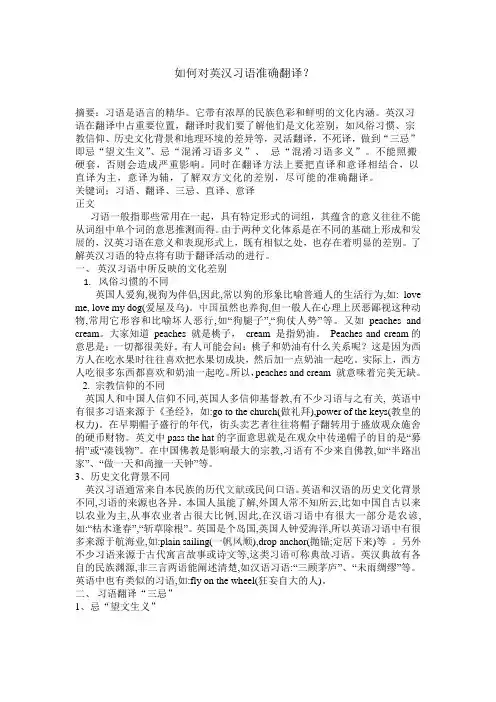
如何对英汉习语准确翻译?摘要:习语是语言的精华。
它带有浓厚的民族色彩和鲜明的文化内涵。
英汉习语在翻译中占重要位置,翻译时我们要了解他们是文化差别,如风俗习惯、宗教信仰、历史文化背景和地理环境的差异等,灵活翻译,不死译,做到“三忌”即忌“望文生义”、忌“混淆习语多义”、忌“混淆习语多义”。
不能照搬硬套,否则会造成严重影响。
同时在翻译方法上要把直译和意译相结合,以直译为主,意译为辅,了解双方文化的差别,尽可能的准确翻译。
关键词;习语、翻译、三忌、直译、意译正文习语一般指那些常用在一起,具有特定形式的词组,其蕴含的意义往往不能从词组中单个词的意思推测而得。
由于两种文化体系是在不同的基础上形成和发展的,汉英习语在意义和表现形式上,既有相似之处,也存在着明显的差别。
了解英汉习语的特点将有助于翻译活动的进行。
一、英汉习语中所反映的文化差别1.风俗习惯的不同英国人爱狗,视狗为伴侣,因此,常以狗的形象比喻普通人的生活行为,如: love me, love my dog(爱屋及乌)。
中国虽然也养狗,但一般人在心理上厌恶鄙视这种动物,常用它形容和比喻坏人恶行,如“狗腿子”,“狗仗人势”等。
又如peaches and cream。
大家知道peaches 就是桃子,cream 是指奶油。
Peaches and cream的意思是:一切都很美好。
有人可能会问:桃子和奶油有什么关系呢?这是因为西方人在吃水果时往往喜欢把水果切成块,然后加一点奶油一起吃。
实际上,西方人吃很多东西都喜欢和奶油一起吃。
所以,peaches and cream 就意味着完美无缺。
2. 宗教信仰的不同英国人和中国人信仰不同,英国人多信仰基督教,有不少习语与之有关, 英语中有很多习语来源于《圣经》,如:go to the church(做礼拜),power of the keys(教皇的权力)。
在早期帽子盛行的年代,街头卖艺者往往将帽子翻转用于盛放观众施舍的硬币财物。
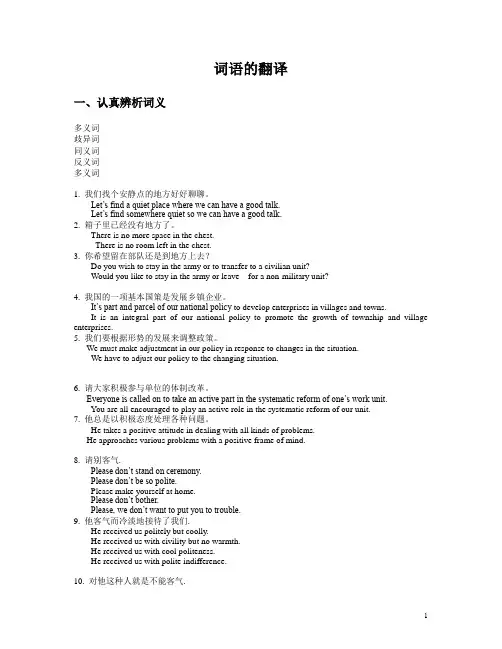
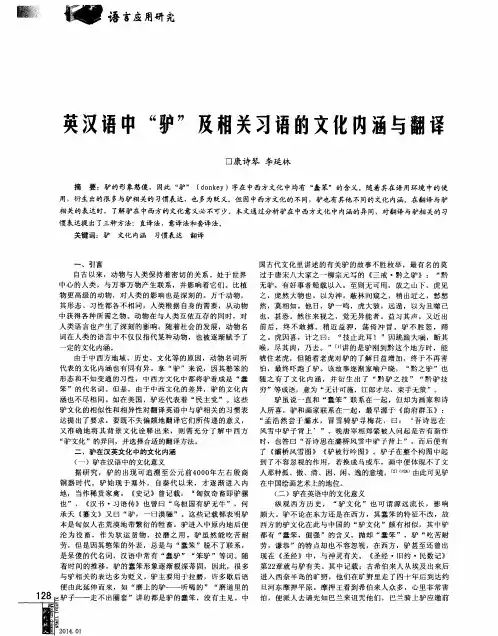
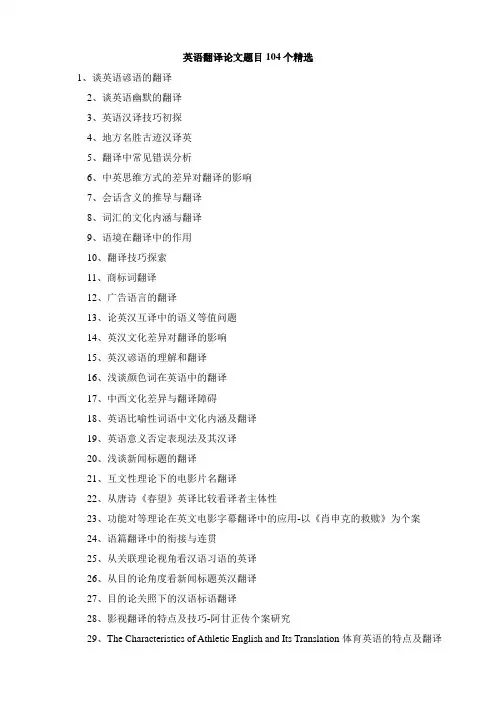
英语翻译论文题目104个精选1、谈英语谚语的翻译2、谈英语幽默的翻译3、英语汉译技巧初探4、地方名胜古迹汉译英5、翻译中常见错误分析6、中英思维方式的差异对翻译的影响7、会话含义的推导与翻译8、词汇的文化内涵与翻译9、语境在翻译中的作用10、翻译技巧探索11、商标词翻译12、广告语言的翻译13、论英汉互译中的语义等值问题14、英汉文化差异对翻译的影响15、英汉谚语的理解和翻译16、浅谈颜色词在英语中的翻译17、中西文化差异与翻译障碍18、英语比喻性词语中文化内涵及翻译19、英语意义否定表现法及其汉译20、浅谈新闻标题的翻译21、互文性理论下的电影片名翻译22、从唐诗《春望》英译比较看译者主体性23、功能对等理论在英文电影字幕翻译中的应用-以《肖申克的救赎》为个案24、语篇翻译中的衔接与连贯25、从关联理论视角看汉语习语的英译26、从目的论角度看新闻标题英汉翻译27、目的论关照下的汉语标语翻译28、影视翻译的特点及技巧-阿甘正传个案研究29、The Characteristics of Athletic English and Its Translation体育英语的特点及翻译30、Chinese Reduplicated Words and their Translation into English 汉语叠词及其英译31、Non-Correspondence in English-Chinese Translation of Color Words中英文翻译中颜色词的非对应32、On the Cultural Signification of Animal Idioms and Translation 动物俚语文化含义与翻译33、Foreignizing and Domesticating Translations in Cross-cultural Vision跨文化视野中的异化和归化翻译34、The Loss of Affective Meaning in Translation ―from the Perspective of Cultural Differences 从文化差异的角度看翻译中情感意义的丢失35、On the Explicitness and Implicitness of Conjunctions in English-Chinese Translation Process 论连词再英汉翻译中的显性和隐性存在36、Approaching Domestication and Foreignization in Translation from a Functional Perspective 从功能翻译角度看归化与异化37、Conversion of Part of Speech in English-Chinese Translation 英译汉中词类的转换38、The Transfer of Culture Image and of English and Chinese Idioms in Translating 论英汉习语翻译中的文化意象的转化VI 旅游英语方向的选题39、科技汉英翻译中的修辞现象述评(An Overview of Rhetoric in Scientific English Translation )40、科技英汉翻译中的虚实互化现象微探(Research on the Change from Abstractness to Concreteness in Scientific Translation )41、翻译方法个案研究如“从海明威的短篇小说《一个干净、明亮的地方》看简洁句的翻译”42、两个译本比较研究或某个译本翻译评论43、某个著名翻译家翻译方法或翻译风格研究44、英汉习语翻译方法研究45、广告翻译策略研究46、Culture Differences and Translation of English &Chinese Idioms47、浅析应用文体之翻译48、烹饪英语翻译探微49、科技英语翻译方法例析50、中式菜谱的英译51、汉语颜色词的英译52、福克勒小说的英译53、英语俚语的汉译54、论英语委婉语的差异和翻译对策55、实用文体翻译中的语言、文化透视结合语言学、跨文化交际等相关内容分析影响实用文体翻译的因素56、关于对外交流翻译中不足的反思如电影名的误译旅游翻译的误译及其他。
“熊”及相关习语在英汉语言中的文化涵义与翻译动物习语作为人类智慧的结晶,承载着鲜明的民族特色和文化内涵,丰富了各民族语言。
在与飞禽猛兽的长期博弈中,人类赋予“熊”这一动物意象特殊的含义因受到所处的地理位置、文化背景及宗教信仰等因素的影响,人们对它的情感错综复杂,自然就产生了不同的联想意义和文化内涵。
本文试图探析“熊”在中西方文化中的不同寓意的同时,努力寻求正确理解和翻译有关“熊”的习语的恰当方法,达到促进中西方文化交流的目的。
标签:熊习语文化内涵翻译方法一、引言在中西方文化中,人们对熊的认识中都保留有强壮、力大无穷和笨拙的特点。
但由于受到不同的地理环境、历史因素、宗教信仰和审美倾向的影响,“熊”在中西方不同文化背景中往往具有不同的文化内涵。
因此,读者在遇到这些习语时,如果不能充分理解相关文化背景下的动物意象,难免会望文生义,造成理解上的偏差。
译者的任务就是充分了解这些意象所代表的文化内涵,恰当地选择翻译方法,还原最本真的意义,帮助读者真正了解原文作者的意图,达到跨文化交流的目的。
二、“熊”在汉英文化中的文化内涵(一)“熊”在汉语中的文化意义“熊”在中华民族文化中历史悠久。
人们对“熊”的崇拜已经成为古代汉文化特有的一种现象。
如从“熊”图腾氏族分出来的姓氏有很多,“熊”姓便是一个很大的分支。
据《世本》《古今姓氏书辨证》及《元和姓纂》等所载,商末人鬻熊才高八斗,学富五车,曾为周文王之师,辅佐周文王推翻殷商建立周王朝,被封为护国侯。
鬻熊曾孙熊绎以王父字为氏,称熊氏。
周朝天子分封诸侯时,西周成王偏僻荒凉的“楚蛮”之地封与熊绎。
熊绎开辟荒野,建立楚国,建都于丹阳(今湖北秭归东南)。
春秋时,楚国疆土倍增,军事实力增强,势力扩展到中原,为春秋五霸之一,自此熊氏便改为熊姓。
“熊”是力量的象征,所以很多习语中的“熊”也代指人,如“虎背熊腰”通常“形容人的身体魁梧强壮”,“熊心豹胆”比喻“人的胆子非常大”。
“老熊当道”比喻“猛将镇守要塞”。
英汉文化中的“羊”及相关习语的翻译羊是人类最早驯养的动物之一,与人类存在着密不可分的联系。
在与人类漫长的相处过程中,羊被赋予丰富的文化内涵和象征意义,成为人们看待世界和表达情感的独特方式,并以习语的形式固定下来。
汉英两种语言中有关羊的习语(包括谚语)数不胜数,在表达了相似或相同意义的同时,又体现出各自独特的文化特征和韵味。
正确理解和翻译这些习语有助于我们了解英汉语言背后的社会历史文化背景。
为了促进中英两种语言、两种文化间的沟通交流,我们在翻译这些习语时应采取不同的翻译策略。
标签:羊习语文化内涵翻译策略一、引言英汉两种语言和文化由于自然环境和社会历史背景等因素存在各种各样的差别,但人们赋予“羊”的情感和象征意义是基本一致的。
不管是在汉语还是在英语中,“羊”代表着人类的衣食之源,象征着人类的温顺、善良等高贵品质,同时又含有弱小、轻贱、无反抗能力和易于迷失等负面含义。
但是,英汉两种语言有着不同的发展轨迹,因而“羊”在两种语言中的内涵也存在些许不同之处。
这些不同的习语和表达法在展现两种文化的独特韵味的同时,给译者在两种语言间的对译中带来不小的挑战。
二、“羊”在汉英文化中的文化内涵(一)汉语中的羊文化在中国人眼里,羊是天地间的精灵,是温驯、祥和、慈善和美好的化身。
所以中国人对羊喜爱有加,赋予其许多积极的象征意义,跟“羊”有关的字词或习语表达比比皆是。
汉语中有关“羊”的成语以贬义居多。
据统计,百分之七十以上跟“羊”有关的成语和习语都含有消极负面的意思:“没本事的人就像羊一样”“羊尾巴盖不住屁股”。
而徒有外表又胆小怕事的人则是“羊质虎皮”,遇事常进退两难如“羝羊触藩”。
有些人总喜欢挑别人的刺,“羊仔笑牛无须”,追求异性时则“羊仔见青好”,不加选择,总是“豆仔看作羊仔屎”,因而“相争一跤箸,放去一只羊”,因小失大。
一个地方因官多而百姓少,是为“十羊九牧”,贪官污吏真是“如狼牧羊”,老百姓犹如“羊入虎口”处于水深火热之中。
最新英语专业全英原创毕业论文,都是近期写作1 浅析《献给艾米莉的玫瑰》中渐渐消失的玫瑰2 “同一性危机”——浅析汉娜的悲剧人生3 试比较中美中学历史教育中历史思维的培养4 从美国刑侦剧《犯罪现场调查》看讯问过程中合作原则的违反5 从目的论角度研究法国香水网络广告语的汉译本的语言特征6 Development, Analysis and Prospect of Chinglish7 拟象性对后现代消费文化的影响8 A Reflection on the Amplification in Chinese-English Translation9 浅析《莳萝泡菜》中的意识流技巧运用10 Pragmatic Study on the Humor Effect in The Big Bang Theory11 以“三美论”对比《登高》两个英译版本的“意美”与“音美”12 简爱的双重性格分析13 语境及其在提高高中学生英语阅读能力中的应用14 苔丝之罪是谁之过15 浅析英语新词的构成与翻译16 从最佳关联原则看口译中的“归化”和“异化”1718 爱伦坡对希区柯克和蒂姆伯顿的影响19 从萨丕尔-沃尔夫假说看中英谚语的文化意象20 论爱情的毁灭:浅析《永别了武器》主题思想21 论《小伙子古德曼布朗》中象征主义的使用22 Verification of Soft Term in Letter of Credit23 小说《紫色》和《妻妾成群》中女主角不同命运的的比较24 意译在广告英语翻译中的重要性探析25 小说《飘》中斯嘉丽的人物性格分析26 从《哈利波特与火焰杯》看文学翻译中的文化冲突27 互联网媒体对汉语纯度影响的研究28 文化交际视野下的语用失误分析29 The Elementary Stage Translation Teaching Design for Undergraduate English Majors30 论《拉合尔茶馆的陌生人》中昌盖茨“美国梦”的转变31 《还乡》中游苔莎的悲剧命运分析32 Hawthorne’s Religious Notion: an Analysis of The Scarlet Letter33 从委婉语的研究中看中西文化差异34 从“绯闻女孩”与“我的青春谁做主”中浅析中美青年婚姻爱情观的异同35 文学作品的风格及其可译性36 从思维方式差异看英语复杂句汉译37 世纪英国继承制度对婚姻的影响38 浅析《喜福会》中的母女关系39 《雾都孤儿》中的浪漫主义与现实主义40 从中美管理方式的不同透析中西方文化差异与整合41 透过七夕和情人节看中西文化差异42 中国的超前消费以及其对“八十后”的影响43 《织工马南》中马南的性格44 从功能派翻译理论的角度看商标名称的英译45 浅析苔丝的悲剧46 《远大前程》与《名利场》叙事技巧比较研究47 自然主义在《野性的呼唤》中的表现48 英语委婉语的认知分析49 《雾都孤儿》中的正邪儿童形象50 从译者的读者意识看童话英汉翻译51 The Rose in the “Heights”—An Analysis on Catherine’s Personality in Wuthering Heights52 《杀死一只知更鸟》中主人公的成长危机53 欧•亨利短篇小说中幽默的翻译54 中西方对鬼怪认识的差异55 伍尔夫的《达罗卫夫人》中的意识流和象征主义手法分析56 女性主义视角下《傲慢与偏见》的情态意义解读57 Study on Characteristics of American Black English from Social Perspectives58 从女权主义视角分析《红字》中海斯特白兰的形象59 师生关系与学生英语学习积极性之关联性探析60 论《芒果街上的小屋》的“简单”61 情感教学在初中英语课堂中的理论和实践62 An Analysis of Textual Functions of the English Passive Voice63 透析《劝导》中的新女性形象64 论《西游记》中文化因素的翻译策略——以詹纳尔和余国藩的英译本为例65 纳博科夫小说《洛丽塔》的爱情讽刺66 探析国际贸易中的跨文化风险67 Black Women's Searching for Identity in Toni Morrison's Sula68 《哈利波特》系列里哈利波特与伏地魔的二元对立分析69 中英寒暄语的对比与研究70 班德瑞曲名汉译策略之解析71 骑士精神对现代社会的影响72 从玛氏公司看英美文化对广告的影响73 小说《蓝色城堡》中的意象和象征主义74 H.G.威尔斯科幻小说中的科学措辞研究75 A Popular Form of Subtitles Translation by Fansub Group on the Internet76 中国旅游指南的中译英研究77 词汇衔接手段在新闻英语中的应用78 中美商务礼仪差异的跨文化解析79 朗读在中学英语教学中的作用80 商务英语信函中的语用礼貌失误81 高中学生英语词汇学习现状研究综述82 A Study on the Translation of Cosmetic Instructions from the Perspective of Functional Equivalence83 社会因素对汉语中英语外来词的影响84 汽车广告英语的语言特点及其翻译85 劳伦斯小说中的女性形象86 对中英组织文化差异的跨文化研究87 习语及习语的汉英翻译88 《红色英勇勋章》主人公亨利•弗莱明心路历程探析89 礼貌原则框架下化妆品广告语篇研究90 论标示语汉英翻译中的等效问题91 试从大卫•科波菲尔分析狄更斯的人道主义精神92 浅析《哈克贝利费恩历险记》中的自由93 对《名利场》中女主人公的性格特征分析94 反思女性主义作家对莎士比亚作品的研究95 农村初中英语口语教学现状的调查与分析——以xx中学为例96 浅谈儿童文学在儿童成长中的作用-弗朗西斯•霍奇森•伯内特《小公主》和《秘密花园》之比较97 英语新词特点研究——词汇学习和了解文化的有效途径98 法律英语翻译中的动态对等理论分析99 浅谈英汉颜色词在使用中的文化差异100 超市价格策略的比较101 从苔丝的悲剧到托马斯•哈代的宿命论102 The Emerging Tendency of Marketing—Network Marketing103 从《哈克贝里﹒费恩历险记》看马克﹒吐温的幽默讽刺艺术104 中美大学生课堂讨论话语性别差异对比105 On the Translation of Children’s Literature in the Light of the Skopostheory:A Case Study of The Adventures of Tom Sawyer106 《小妇人》与《傲慢与偏见》中女性爱情观对比研究107 论促销在市场经济中的重要性108 Perseverance in Belief—On the Death of Martin Eden109 《爱玛》女主角爱玛伍德豪斯人物分析110 文化碰撞和融合——探讨少数裔文化在美国主流文化下的生存111 英语商务信函的礼貌用语112 黑人英语克里奥起源论113 A Study on Narrative Techniques in A Rose for Emily114 违反合作原则所表达的会话含义—以《越狱》中Theodore Bagwell话语为例115 从《喧哗与骚动》中凯蒂的悲剧看世纪初女性的社会地位116 Doomed Tragedy out of Desire-Driven Morbid Personalities in Nabokov’s Lolita117 《儿子与情人》恋母情结分析118 从合作原则分析《生活大爆炸》中字幕幽默的翻译119 Scarlett O'Hara and Feminism120 跨文化交际下的中英文禁忌语的对比研究121 论中西方时间观念差异对日常生活的影响122 A Tentative Study of the Origin of American Place Naming123 Ha wthorne’s Feminism Consciousness in The Scarlet Letter124 中美称赞语的对比分析125 思维差异对中美商务谈判的影响及应对策略126 从《鲁滨逊漂流记》看人的性格对命运的决定作用127 多丽丝·莱辛的《金色笔记》中的怀旧情绪128 李尔王和格勒旺布王比较研究129 A Study of Cultural Influence upon Internet Language130 高中英语教师课堂提问的现状及有效策略研究131132 从《嘉莉妹妹》看本性与理性的斗争133 从《盲人》中的“血性意识”看劳伦斯的文明观134 论商标翻译中存在的问题及对策135 浅析英文电影在高中英语教学应用136 试探吸血鬼文化的起源137 《药》的两个英译本中翻译技巧比较138 主语显著和话题显著—英汉语对比分析139 浅谈《阿拉比》的写作手法及其瘫痪主题140 英语影视的课堂价值141 从《麦琪的礼物》看欧亨利留给世人的礼物142 从新闻用语特点对比中西方文化差异143 《傲慢与偏见》中人物对白之语用学分析144 论罗伯特弗罗斯特诗歌的黑色基调---在美国梦里挣扎145 跨文化交际中身势语的运用对比分析146 论《永别了,武器》的写作风格147 中外青年婚姻观念差异——从《柳堡的故事》和《傲慢与偏见》中进行对比148 论中美商务谈判风格的差异149 中西民间鬼神形象中体现的宗教世俗化的研究150 浅析《儿子与情人》中的恋母情结151 论跨文化因素对广告汉英翻译的影响152 从认知语境角度探究社交语用失误的原因153 Semantic Analysis of the Chinese Word of Bai and Its Translation Strategies154 从安利(中国)的成功看直销模式在我国的发展155 从女性主义视角看《抽彩》女主角的命运156 中美商务英语信函的对比研究157 论中西文化的差异对习语翻译的影响158 海明威的矛盾性格在其作品中的体现159 An Analysis of the Image of Prisons in A Tale of Two Cities160 The Lost Generation—“Nada” in Hemingway’s “A Clean, We ll-Lighted Place”161 《隐形人》中格里芬的心理剖析162 Study on Net Lexicon and Its Future Trend163 论英语新课标下高中生跨文化意识的培养164 中英动物习语的跨文化分析165 黑人英语与非裔美国黑人文化的研究166 An Analysis on Teacher Talk in EFL Classroom Context167 浅论《洛丽塔》主人公悲剧命运的根源168 科技英语语篇中的语法隐喻研究169 Advertising Language: A Mirror of American Value170 论有效开展小学英语对话教学的策略171 埃德加爱伦坡哥特小说中的死亡主题探索172 从功能对等视角浅析法律翻译中的文化因素173 《瓦尔登湖》生态批评视角分析174 浅谈自有品牌在中国零售企业的发展175 从《宠儿》透视美国黑人女性的悲剧176 An Analysis of David’ s Dual Personality in David Copperfield177 报刊杂志词频分析与大学英语教学中词频分析的比较178 从违反合作原则研究《生活大爆炸》179 从关联理论看《博物馆奇妙夜》的字幕翻译180 《永别了武器》中战争对人类所造成的毁灭181 浅析《库珀尔街》中英语过去时的翻译182 顺应论视角中电影字幕汉英翻译研究——以李安电影作品字幕翻译为例183 不同文化背景下的中美家庭教育对比184 中英商标翻译中的文化障碍与翻译策略研究185 从翻译角度浅析英语写作中的中式英语问题186 英汉爱情隐喻对比研究187 理想政体的历史超越性探因——《理想国》、《乌托邦》和《新亚特兰蒂斯》中哲学家的自我中心共性188 文本分类理论与广告翻译189 Lin Yutang and his Translation of the Analects190 论《毒日头》中的生命价值观191 动之以情,晓之以理---浅析语法情景教学在中学英语课堂中的设计与运用192 中西俚语中动物意象的对比分析193 从文化角度看英语习语的翻译194 从绝望到适应——鲁滨逊在孤岛上的心理变化195 Strategies of Advertising Slogans Translation from the Perspective of “Three Beauty” Principle196 论中英日常礼貌用语的差异197 英汉委婉语的对比与翻译198 浅谈教师与学生之间的课堂交流199 小说《鸡蛋的胜利》中扭曲的“美国梦”200 Cultural Input and Syllabus in English Teaching。
汉英翻译考试复习材料汉英翻译考试复习材料汉语词语和英语词语之间不存在机械的对应,翻译中不能随意把某个汉语词和某个英语词划上等号。
开展水平 level of development 英语水平 English proficiency 生活水平living standard 游泳水平 swimming skills 领导水平 art of leadership 使你的工作保持在高水平上 Keep your work on a high plane.把我们的素质提高到一个新的水平 to raise our quality to a new height 住房紧张 housing shortage 历史经验 past experience这家工厂只有几年的历史。
This factory was set up only a few years. 他主要抓生产。
He is mainly in charge of production.他抓紧时间进行技术训练。
He lost no time in technical training. 这部电影抓住了许多观众。
The movie appealed to a lot of audience. 抓重点stress the essentials关心人民生活 to care about the living of the people 关心局势开展 to follow the developments closely 共同关心的问题 issues of mutual interest 我们关心中国是否能保持持续开展。
We would like to know whether China will be able to achieve a sustainable development.领导人对两国关系的开展非常关心。
Our leaders have taken interest in the development of our bilateral relations.在这种情况下 under these/such circumstances; such being the case; in accordance with this specific condition这种情况必须改变。
毕业论文题目:小论习语及习语的汉英翻译Title: On Idioms and Their Translationfrom Chinese into English2008年 05月20 日AcknowledgementsFirstly, I will pay my appreciation to my family. It is who have given me so many supports and suggestions I could finally finish this paper. Their love always gives me enough confidence in myself and in my writing course.I also want to thank my dear teachers who taught me lots of things throughout all fields so that I can finish my thesis. These teachers are really the most important part in my thesis writing. Thanks to my grammar teacher, she taught me a lot during the courses so that I can have enough knowledge to finish my paper. Thanks to our writing course teacher Mr. Cai.Finally, I will give my deepest appreciation to my supervisor, Mrs. Liu. She always helps me to revise my thesis and gives me valuable suggestions, she plays a very important part in my thesis writing. Thanks all of them so much!AbstractIdioms are just like incomparably resplendent bight pearls emitting dazzling rays in the palace of literature. Throughout the ages, they animate the works of countless men of literature and writing. Idioms have fixed patterns and abundant connotations. Their vivid images explicitly convey incisive meanings. Chinese idioms are part of the essence of Chinese culture with a history of thousands of years. In this thesis, the English translation of Chinese idioms will be discussed on the foundation of simply introducing the definitions, origins, features, and classifications of idioms, and a series of principles and methods of idiom translation will be put forward, mainly involving the translation of the Chinese idioms which have similar and dissimilar implications in English.the dissertation attempts a probe and thesis discussed on 9 aspects, which include the overall features of English idioms and Pragmatic Context, speech acts, conversational implicative, the role of discourse and pragmatic features, the negative significance of rhetoric and the actual use of language with the use with nine variations, such as aspects of the brief and arguments. It is hoped that, by studying the idiom, this thesis will provide some help to idiom learners and those who are working in this field.Key words: Chinese idioms;similarity;Dissimilarity习语犹如文学殿堂里一颗璀璨无比的明珠放射着历久不衰的光芒,古往今来,无数文人墨客的笔下都闪耀着它的异彩。
它结构固定而涵义深刻,用生动的形象明确地表达着深刻的思想。
汉语习语是几千年华夏文化的精髓之一。
本文在简单介绍习语就的定义,来源,特点及分类的基础上,研究汉语习语的英语翻译并提出一系列的汉语习语英译的翻译原则和翻译方法,其中主要涉及对似和非对似汉语习语的英语翻译等几个方面进行分析与总结,还从认知的、社会的和文化的整体角度对英语习语的特征、语用语境、言语行为、会话含义、语篇作用、语用功能、否定意义、修辞语用以及实际运用中的活用与变体等9个方面的问题进行了简略的的探讨和论述。
通过对英语习语的研究,希望对英语学习者有所裨益。
关键词:汉语习语;对似性;非对似性I. Introduction to Idioms (2)1.1 Definition of Idioms (2)1.2 Origins of Idioms (3)1.3 Features of Idioms (7)1.4 Classifications of Idioms (8)II. Idioms with Similar and Dissimilar Implications in Chinese and English (9)2.1 Idioms with Similar Implications (9)2.2 Idioms with Dissimilar Implications (9)Ⅲ.Translation of Idioms with Similar and Dissimilar Implications from Chinese into English (10)3.1 Methods and Principles for English Translation of Chinese Idioms (10)3.2 Principles for English Translation of Chinese Idioms with Dissimilar Implications in English. (12)Bibliography (15)IntroductionLanguage is the most important communicative tool of all human beings. It plays its role as not only the carrier and form of culture but also the most vital element of transmission and inheritance of culture. Language of any kind is the crystallization of the culture of its own nation. As the cream of the culture, the idiom is a kind of widespread set phrases or sentences, with specific implications, abstracted from the spoken language and experience of the people and the classical works. Due to its vivid image and profound connotation, the idiom is deeply loved by the masses, as a member with fine expressible ability in the family of language. Idioms frequently appear in the spoken language and literary works. Chinese idioms have a solid cultural base to take root, develop and flourish now that the Chinese nation has broad and profound culture. Nowadays, the international status of China is upgrading gradually. People all over the world take delight in acquainting themselves with Chinese culture. As the essence of Chinese culture and the crystallization of the wisdom of the common Chinese people, idioms are bound to become an important part to promote the Chinese culture to the knowledge of people of all the other countries. The idiom is a contact point of the knowledge of the Chinese culture for people all over the world. To sum up, in order to make the western peoples know Chinese culture thoroughly, the study of the English translation of Chinese idioms is quite necessary and of far-reaching significance.Ⅰ.Introduction to IdiomsIdioms are those set phrases or short sentences abstracted from the spoken language or classical works, and the like. They were passed from generation to generation for centuries. Idioms are the crystallization of people’s wisdom. After thousands of years’ accumulation, idioms are provided with vivid images, profound implications and exquisite rhythms. Idioms could reflect the local customs and practices of different regions, the living style of the people, the natural environment and so on. We could see that the idiom has a very strong color of its nation. Therefore, to understand and study the idiom is supposed to start from its definition, origin, features, and classifications.1.1. Definition of IdiomsAs for the definition of idioms, there are various editions according to different dictionaries. I picked out some of those definitions from some authoritative dictionaries as follows:(1) An idiom is an expression which functions as a single unit and whose meaning cannot be worded out from its separate parts (Longman Dictionary of Applied Linguistics, 1985) and An idiom is a phrase, construction or expression that is recognized as a unit in the usage of a given language and either differs from the usual syntactic patterns or has a meaning that differs from the literal meaning of its parts taken together. (Webster’s New World College Dictionary 3rd Edition, 1996)Some experts, who have been engaged in the study of idioms for many years, also have opinions of the definition of idioms.(2) Weinreich held the view that a phraseological unit involving at least two polysemous constituents, and in which there is a reciprocal contextual selection of subsenses will be called and idiom.(3) Schweigert and Moates have the idea that idioms are common expressions used in colloquial speech with accepted, figurative meanings that differ from their present-day literal meanings. These above are from dictionaries and experts orscholars. To sum up, we may come to the conclusion that idioms are those concise and incisive set phrase or short sentences, which mean something different from the literal meaning of the individual words, refined from people’s long-term employment, whose elements cannot be changed at random with simple words producing profound truth, thus widely spread among the common people.1.2 Origins of IdiomsThe formation of idioms is on intimate terms with the culture of the nation which its language relies on. In a sense, the culture gives birth to the idioms. On the contrary, the idioms reflect all the features of the culture. Each nation has its own national culture which owns a distinctive style and tradition that come into being in the course of their work and life, including history, language, custom, life style, ways of thinking, and so on . Idioms, a kind of language form used by the people for a very long time, to a great extent, rely more on the specific social cultural connotations than the common words. Idioms, having an extremely strong color of a nation are one of the marks differentiating one language from another. Thus, the origin of the idioms may be quite varied.1.2.1 The Experience of the Common PeopleFor thousands of years, people drew lessons and experience from their daily life, and then wrote them down to tell their offspring what they had got from their experiences. As a result, most of the idioms could invariably mirror almost everything related to the life of the common people. Take those reflecting the geographic environment of people’s inhabitations as example, Britain is a country with small land area but a long coast line; so many English idioms are relevant to the ocean. People in Britain always co mpare fish to the people. For example, they use ‘cold fish’ to describe a person who is unconcern to something and ‘feel like a fish out of water’ to express a feeling that is uncomfortable and unnatural. People always wrote down the lessons they got from their experience, just as the idiom ‘who has never tasted bitterknows not what is sweet’ telling the people if you don’t undergo hardships, you will never know what happiness is. At the beginning of human society, owing to the low productivity and lack of further knowledge of most common phenomena of the society at certain stage, people always held a kind of belief in some imaginary things or power. People believed that there existed another world in the heaven where the immortals lived and to which their ancestors would go after death. They regarded it as a carefree place where happiness lives permanently. Thus, when they were in trouble or suffered from hardships, they would rely their hope to good fortune on going to the carefree place or afterlife which they firmly believed to exist. So many idioms are about people’s religions or beliefs. For instance, there is an idiom ‘man proposes, god disposes’. Because people in the western countrie s consider that God is almighty, and human beings are paltry before God. ‘As poor as church mouse’ indicates that somebody is as poor as the mouse in the church where everything had been washed clean.1.2.2 Myths and FablesIn any nation, of any culture, there exist plenty of myths. At the first birth of the nation, its culture began to come into prosperity as well. A large mass of myths were produced orally and in the written form. Those myths were passed down to next generation for centuries and were read by the people in each period of time. Hence those myths left a deep impression on people’s mind. Nearly everyone in a nation has an intimate knowledge of those myths. From generation to generation, lots of symbolic idioms stand out from those myths and are employed to convey some special or specific and regular meanings. Take the idioms from the Greek- Roman myths as examples, people constantly use ‘Achilles’ heel’ to indicate the crucial and strategic point or fatal weakness (Achilles is the hero in the Trojan War), and apply ‘Pandora’s box’ to signify the root of the disaster (Pandora, a beauty who brought the disasters down to the world). Chinese myths also generate numerous idioms, such as, ‘八仙过海各显神通’ which originated from the myth about the eight immortals, it shows us the denotation that Eight Immortals crossing the sea, each one showinghis/her special prowess. Therefore, people always apply this idiom to deliver the figurative meaning that several outstanding persons try to outshine each other. Fables are a sort of literary form, in which the animals or things are often personified to teach people a lesson or truth, with satiric and admonitory feature and is widely spread for its short form, vivid image, appropriate comparison and profound message. For this reason, most of the fables are condensed and sublimated into idioms to be frequently used in people’s everyday life. The idioms coming from the fable lie in the following examples, ‘自相矛盾’ from a Chinese fable, reveals its meaning that someone contradicts himself. ‘Aesop’s fables’, which are known well by the people not only in the western countries but also in China, give birth to numerous idioms. Such as, ‘count one’s chicken before they are hatched’ meaning resting one’s hopes on the uncertain things. The idiom ‘look before you leap’ is regularly applied to tell the people to give a matter the second thought or act with prudence.1.2.3 Historical Events and AnecdotesIn any nation, any country, people once experienced periods of ups and downs. They not only achieved brilliance but also suffered from miseries. In that way it maybe, those events, great or not, indeed had branded the history deeply. They’re so innumerable that even the historians can hardly record thoroughly. Most of those events left deep impression on people’s mind and taught us many lessons, thus were often mentioned and later fixed in the form of idioms. As we all know that Waterloo is the place where Napoleon was defeated by the allied forces of Britain, Germany and Netherlands, etc, commanded by Duke of Willington. Therefore, ‘meet one’s Waterloo’ is employed to represent a crushing defeat.In the Spring and Autumn Period (770-476) in Chinese ancient times, GouJian, the king of the Yue kingdom, slept on brushwood and tasted gall after he was defeated by the Wu kingdom so as to undergo self-imposed hardships to remind himself never to forget the humiliation given by the king of the Wu kingdom and go all out to make his country strong. So we Chinese people later make use of the Chinese idiom ‘卧薪尝胆’ to sing a kind of a spirit if enduring tremendous hardships and humiliations to remind oneself to make adetermined effort to accomplish some ambitions. There are also many idioms originated from anecdotes. For instance, ‘eat crow’, formed in the per iod of the war between Britain and America, was employed to give us the meaning that somebody is forced to confess the mistake he has made.1.2.4 Classical Literary WorksLiterature is a kind of artistic form of language and also the constituent and carrier of the culture of a nation. Most classical literary works written by great masters of literature in every country are invariably appreciated by people all over the world. Thus, the words and sentences with profound meaning and enlightenment always form idioms, the essence of the languages. Shakespeare, who is known as the greatest playwright in the world, is also a poet in the Renaissance in Britain. His works are greatly enjoyed by people all over the world from his time to the present. His works g ive birth to lots of idioms, Such as ‘one’s pound of flesh’ coming from The Merchant of Venice, which is used to describe a legal but unreasonable requirement. The Chinese idiom ‘鸦雀无声’ from the Chinese classical novel The Dream of the Red Mansions is employed to express a perfect silence.1.2.5 Social Customs and HabitsEach nation has its own social customs and habits which are created by people of its own nation living together for a very long time. The formation of those customs and habits is closely linked with the natural condition, social environment, life style, tradition, etiquette and belief or even superstition. In Britain, where people like to wear hats, when they greet somebody or extend their respects to others, they will take off their hats. Therefore, they employ ‘take off one’s hat to somebody’ to express the meaning that a person pays one’s respects to somebody. In China, people take the red color as their favorite color since ancient times; for they think the red color symbolizes happiness, flourish, brightness and success. For instance, people in China apply ‘鸿运高照’ to indicate that someone has good fortune on his side. On the contrary, people in the western countries always regard red as ill omen or violence.Thus, when they describe an ill omen, they will use ‘red for danger’. So we could come to the conclusion from this phenomenon that different nation has different customs, habits and cultures.1.3 Features of IdiomsIdioms display its differentiation from other general expressions or structures in its own distinctive features.1.3.1 Fixed StructureA specific idiom is a set phrase or accepted phrase. So the main feature is that it has fixed structure, which cannot be divided and split into small parts. For example, ‘make haste’ (hurry up) cannot be separated as ‘make him haste’. Meanwhile, a complete idiom cannot be used separated in two different sentence or subordinate clauses. For instance, ‘read the riot act’ (give a warning) cannot be used like ‘it was the riot act that John read to me’. The word in the idiom cannot be changed at random, even though the replacement of the synonyms will make the idiom lose its original meaning. Such as, ‘smell a rat’ (be suspicious of something) cannot be changed into ‘smell a mouse’. Some of the structures of the idioms violate the normal grammatical rules, but we also cannot shift them into correct grammatical forms for the reason that it has a fixed structure. Give an example, ‘as sure as eggs is eggs’ (absolutely true)All in all, the idioms have fixed structure, words, voice, order, forms of number and part of speech. All above mentioned cannot be altered. What we need to do is to employ the idioms directly not to transform them into any other forms.1.3.2 Abundant ConnotationsSeidl and McMordie once said that meaning is the most important thing for the idiom. The abundant connotations of the idioms mainly lie in its figurative meaning. The idiom’s r ich implications also depend on the fact that the words forming the idioms do not mean literally or not the addition of the simple meaning produced by each word. We must understand them on the whole or from their origins. For example, ‘rain cats and dogs’ means rain heavily.Many idioms have duality in meaning both literally and idiomatically. On most occasions, the literal meaning and idiomatical meaning of the idioms are totally unrelated. So we can simply judge its meaning by the context, which could help us a lot to figure out its connotation. Moreover, through similes and metaphors, the idioms could express their meanings more vividly and specifically.Even some of the idioms disobey the correct grammatical rules; it can also produce a special and specific meaning. By contrast, the other common structures and forms cannot achieve such a purpose.1.3.3 Distinct Cultural FeatureIdioms are the gorgeous treasures glittering with the light of wisdom in the literary treasure-house of their own nation either in Chinese or English. So the idiom is just as a mirror reflecting the distinguishing feature of a nation or culture. Chinese and English nations are entirely different ones with respective characteristics in history, geography, culture, customs, religion and the like. As a special language phenomenon, idiom has a strong color of its own nation either in content or in form. For example, to describe the fact that some kind of newly emerging things develop very rapidly, we Chinese people use ‘雨后春笋’ (it means that something springs up like bamboo shoots after a spring rain). However, in English, people will say something springs up like mushrooms after raining. Most idioms have symmetrical pattern, exquisite syllables and harmonious rhythm. Besides, penetrating implication, vivid images and succinct wording characterize the idioms likewise. Those unique features of idioms should be retained as much as possible in translation.1.4 Classifications of IdiomsThe word ‘idiom’ in English has its semanti c meaning in a narrow and broad scope. In a limited sense, idioms just signify the set phrase or short sentences with fixed structure and complete meaning employed by the people for a long time. They usually contain four words in Chinese but uncertain number of words in English.However, in a broad sense, the idiom is also defined in an almost same way, but it is composed of set phrases, idioms (in the narrow sense), two-part allegorical sayings, allusions, proverbs, maxims, sayings, epigrams, slang expressions colloquialisms, quotations and jargons. Those listed above are all revised and rewritten again and again, and then handed down from generation to generation. Up to the present, they are widely applied and studied by all the people.Ⅱ.Idioms with Similar and Dissimilar Implications in Chinese and EnglishChinese and English are two languages with great discrepancies either in phonetics, grammar, or in written forms. There exists a world between them, whereas people of the Chinese and English nations have more or less the similar or even identical experience and feeling owing to some unavoidable similar or equal experience in their production and daily life. Those experiences and feelings that were written down and employed again and again and then widely spread have finally shaped concise and comprehensive idioms, which have astonishing similarities in implication and occasion in which these idioms are used, even though the idioms are from entirely different languages. As a result, there emerge idioms with both similar and dissimilar implications in Chinese and English.2.1 Idioms with Similar ImplicationsThe so-called idioms with similar implications are those with similar meanings and applied on nearly conformable occasions both in Chinese and English.2.2 Idioms with Dissimilar ImplicationsIdioms in Chinese and English with dissimilar implications refer to those having completely different meanings and the occasions in which the idioms are used are notalike as well.Ⅲ.Translation of Idioms with Similar and Dissimilar Implications from Chinese into EnglishDissimilar Implications from Chinese into English. Just as what I said before, there exist so many idioms with similar and also dissimilar implications both in Chinese and English. When we translate the Chinese idioms into English, we could employ those idioms with similar implication in English directly for the reason that the implications of some English idioms are nearly exactly the same as some Chinese idioms’ except for some di fferentiations posed by different cultural background. Then, the ways of translation of idioms with similar and dissimilar implications from Chinese into English will be discussed bellow.3.1 Methods of English Translation of Chinese Idioms with Similar Implications in EnglishSome Chinese idioms are so close to the English idioms both in literal meaning and in connotation. So when we translate those idioms from Chinese into English, we’d better borrow them directly so as to make the English readers e asily understand, because as the language of their own nation, they could comprehend the connotation and cultural background obviously without any impediments. However, what we must pay attention to is that we could not apply those idioms with very strong color of the western nations and culture when we translate the Chinese idioms into English in order to avoid confusion of meaning and misunderstanding of the writing purpose of the author. The idioms, with similar implications in English that we could casually use are those neutral idioms without any colors of the western nations and signs of the English cultural background. Otherwise, the rendering will be neither fish nor fowl.3.1.1 Examples of Translation of Chinese Idioms with Similar Implications inEnglishThe Chinese idioms with similar implications in English could be translated in a relatively easy way because we can make direct use of the English idioms having similar implications with the Chinese idioms. The following are some of the similar idioms in Chinese (on the left) and in English (on the right).(1) 爱屋及乌: love me, love my dog.(2) 一箭双雕: to kill two birds with one stone(3) 火上浇油: to add fuel to the fire(4) 乱七八糟: at sixes and sevens(5) 入乡随俗: do in Rome as the Romans do(6) 知足常乐: content is happiness(7) 鸟瞰: a bird’s view(8) 善有善报: do well and have well(9) 竹篮打水: draw water with a sieve(10) 一鸟在手胜于二鸟在林: a bird in hand is worth two in the bush(11) 一丘之貉: birds of a feather(12) 人不可貌相: don’t judge by appearance(13) 空中楼阁: a castle in the air(14) 杀鸡取卵: to kill the goose that lays the golden eggs(15) 露马脚: to show the cloven hoof3.1.2 Examples of Translation of Chinese Idioms with Dissimilar Implications in EnglishIn addition to those Chinese idioms that have similar idioms in English and we can borrow directly to translate, there remains a great number of idioms which have no similar idioms in English. Thus, we must employ other methods to translate.(1) 初生牛犊不怕虎: new-born calves make little of tigers(2) 城门失火殃及池鱼: a fire on the city will brings disaster to the fish in the moat.(3) 三人行必有我师焉: if three of us are walking together, at least one of the other two is good enough to be my teacher(4) 轻如鸿毛: to be as light as a feather(5) 亡羊补牢犹未晚矣: it is not too late to mend the fold even after some of the sheep have been lost(6) 塞翁失马焉知非福: a loss may turn out to be a gain(7) 大意失荆州: to suffer a major setback due to carelessness(8) 巾帼英雄: a female hero(9) 此地无银三百两: a guilty person gives himself away by conspicuously protesting he is innocence(10) 纸上谈兵: to talk about stratagems on paper; empty talk, armchair strategy(11) 万事俱备只欠东风: all is ready, but there is no east wind; all is ready except what is crucial(12) 井底之蛙: a frog in a well that sees the sky as small as the mouth of the well; a person with a very limited outlook(13) 临渊羡鱼: just longing for fish by the waterside without doing any practical thing; it is no use just having ambitions but no actions(14) 醉翁之意不在酒: the drinke r’s heart is not in the cup; to have ulterior motives(15) 擀面杖吹火一窍不通: one cannot flow into a fire with a rolling pin; to be entirely dull or ignorant of apprehension3.2 Principles for English Translation of Chinese Idioms with Dissimilar Implications in English.Due to the discrepancies between Chinese and English cultures and the different life styles and customs between people in China and in English speaking countries, it is natural that we could not find similar idioms of one language in the other language. For the reason above, there occur several principles to be followed when the translation work of Chinese idioms into English is done.3.2.1 Principle 1: Translating Chinese Idioms into English in a Correct and Accurate WayTranslation means to change speech or writing form from one language into another. The most successful translation work could make the target language readers have a sense of reading the original by achieving faithfulness, expressiveness, and elegance (the three standards of translation) in the course of translation. Most Chinese idioms have no similar idioms in English; we have to translate those Chinese idioms by ourselves to English readers. The basic and main principle which the translators must obey is to render those idioms in a correct and accurate way. In this process, the translators must keep themselves away from false understanding of the original Chinese and ambiguous words which are employed. Only do we apply proper words which can render the accurate implications of those idioms, the English readers could have a better and comprehensive understanding of the essence of Chinese culture. That is the very goal that we all Chinese people are striving to achieve today when we energetically carry forward the splendid culture of the Chinese nation.3.2.2 Principle 2: Keeping Chinese Cultural ColorsAt the time of translating the Chinese idioms into English, another important rule to be followed is to keep Chinese cultural colors. The formation of most Chinese idioms is bound up with plentiful historical events, names of the historical people, and some places where many great historical events or something special happened. Therefore, Chinese idioms could amply mirror the excellent cultural tradition of the Chinese nation from ancient times to the present. In order to make people outside China easily acquaint themselves with all the brilliant cultural achievements made by the great Chinese people through those idioms with strong color of Chinese national culture, the distinctive features of some Chinese culture must be properly kept rather than being abandoned in the process of translating. Only in this way could those idioms retain the cream of Chinese culture, thereby the English readers could have a thorough understanding of Chinese history, culture and customs, and then, all that could be widely transmitted all over the world and produce a far-reaching influence on the whole world. In the meantime, the splendid accomplishment of Chinese culture achieved by Chinese people could be passed down to the next generation.。